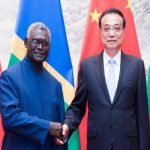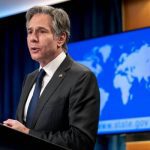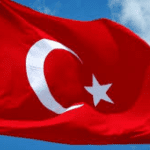The UK has defended its decision to suspend some arms sales to Israel.
Israeli Prime Minister Benjamin Netanyahu has called the decision “shameful”, saying on social media that it “will only embolden Hamas”.
But Husam Zomlot, the Palestinians’ top envoy to the UK, called the partial ban an “important first step” to the UK’s fulfilment of its “legal obligations under domestic and international law”.
On Monday, the UK suspended around 30 out of 350 weapons export licences to Israel.
But UK Defence Secretary John Healey insisted the UK remained a “staunch ally” of Israel, telling the BBC Israel’s security would not be weakened by the decision.
Government ministers say the weapons could be used in Gaza to violate international law. But human rights group Amnesty International UK said the measures were “too limited”.
Others have criticised the timing of the announcement for coming on the same day funerals took place for six hostages killed by Hamas last week.
Mr Healey told BBC Breakfast it was “agonising” seeing the faces of the dead hostages but explained the timing was “driven by the fact that this was a legal process” and the need to report to Parliament.
Foreign Secretary David Lammy said on Monday the UK would be suspending 30 out of 350 arms export licences to Israel, affecting equipment such as parts for fighter jets, helicopters and drones.
Talking to BBC Breakfast, Mr Healey said these were chosen because they supplement equipment used in Gaza for “offensive purposes”, while the “vast majority of other parts our country exports to Israel are either not related to the conflict or maybe used for Israel’s defence”.
UK arms sales to Israel are small in comparison to other allies, contributing just 1% of the country’s defence imports.
The UK exports arms to multiple countries including Ukraine, Saudi Arabia and Turkey.
The US is by far the largest supplier of arms to Israel, accounting for 69% of its imports of major conventional arms between 2019 and 2023, according to the Stockholm International Peace Research Institute.
In a statement, Mr Zomlot said that the Palestinian Mission to the UK would “continue working” with the UK government towards a “full arms embargo”.
Amnesty International UK accused the government of “gesture politics” given less than 10% of arms export licences were suspended.
The charity’s chief executive, Sacha Deshmukh, said the restrictions were “too limited and riddled with loopholes”.
The UK has defended its decision to suspend some arms sales to Israel.
Israeli Prime Minister Benjamin Netanyahu has called the decision “shameful”, saying on social media that it “will only embolden Hamas”.
But Husam Zomlot, the Palestinians’ top envoy to the UK, called the partial ban an “important first step” to the UK’s fulfilment of its “legal obligations under domestic and international law”.
On Monday, the UK suspended around 30 out of 350 weapons export licences to Israel.
But UK Defence Secretary John Healey insisted the UK remained a “staunch ally” of Israel, telling the BBC Israel’s security would not be weakened by the decision.
Government ministers say the weapons could be used in Gaza to violate international law. But human rights group Amnesty International UK said the measures were “too limited”.
Others have criticised the timing of the announcement for coming on the same day funerals took place for six hostages killed by Hamas last week.
Mr Healey told BBC Breakfast it was “agonising” seeing the faces of the dead hostages but explained the timing was “driven by the fact that this was a legal process” and the need to report to Parliament.
Foreign Secretary David Lammy said on Monday the UK would be suspending 30 out of 350 arms export licences to Israel, affecting equipment such as parts for fighter jets, helicopters and drones.
Talking to BBC Breakfast, Mr Healey said these were chosen because they supplement equipment used in Gaza for “offensive purposes”, while the “vast majority of other parts our country exports to Israel are either not related to the conflict or maybe used for Israel’s defence”.
UK arms sales to Israel are small in comparison to other allies, contributing just 1% of the country’s defence imports.
The UK exports arms to multiple countries including Ukraine, Saudi Arabia and Turkey.
The US is by far the largest supplier of arms to Israel, accounting for 69% of its imports of major conventional arms between 2019 and 2023, according to the Stockholm International Peace Research Institute.
In a statement, Mr Zomlot said that the Palestinian Mission to the UK would “continue working” with the UK government towards a “full arms embargo”.
Amnesty International UK accused the government of “gesture politics” given less than 10% of arms export licences were suspended.
The charity’s chief executive, Sacha Deshmukh, said the restrictions were “too limited and riddled with loopholes”.
The UK has defended its decision to suspend some arms sales to Israel.
Israeli Prime Minister Benjamin Netanyahu has called the decision “shameful”, saying on social media that it “will only embolden Hamas”.
But Husam Zomlot, the Palestinians’ top envoy to the UK, called the partial ban an “important first step” to the UK’s fulfilment of its “legal obligations under domestic and international law”.
On Monday, the UK suspended around 30 out of 350 weapons export licences to Israel.
But UK Defence Secretary John Healey insisted the UK remained a “staunch ally” of Israel, telling the BBC Israel’s security would not be weakened by the decision.
Government ministers say the weapons could be used in Gaza to violate international law. But human rights group Amnesty International UK said the measures were “too limited”.
Others have criticised the timing of the announcement for coming on the same day funerals took place for six hostages killed by Hamas last week.
Mr Healey told BBC Breakfast it was “agonising” seeing the faces of the dead hostages but explained the timing was “driven by the fact that this was a legal process” and the need to report to Parliament.
Foreign Secretary David Lammy said on Monday the UK would be suspending 30 out of 350 arms export licences to Israel, affecting equipment such as parts for fighter jets, helicopters and drones.
Talking to BBC Breakfast, Mr Healey said these were chosen because they supplement equipment used in Gaza for “offensive purposes”, while the “vast majority of other parts our country exports to Israel are either not related to the conflict or maybe used for Israel’s defence”.
UK arms sales to Israel are small in comparison to other allies, contributing just 1% of the country’s defence imports.
The UK exports arms to multiple countries including Ukraine, Saudi Arabia and Turkey.
The US is by far the largest supplier of arms to Israel, accounting for 69% of its imports of major conventional arms between 2019 and 2023, according to the Stockholm International Peace Research Institute.
In a statement, Mr Zomlot said that the Palestinian Mission to the UK would “continue working” with the UK government towards a “full arms embargo”.
Amnesty International UK accused the government of “gesture politics” given less than 10% of arms export licences were suspended.
The charity’s chief executive, Sacha Deshmukh, said the restrictions were “too limited and riddled with loopholes”.
The UK has defended its decision to suspend some arms sales to Israel.
Israeli Prime Minister Benjamin Netanyahu has called the decision “shameful”, saying on social media that it “will only embolden Hamas”.
But Husam Zomlot, the Palestinians’ top envoy to the UK, called the partial ban an “important first step” to the UK’s fulfilment of its “legal obligations under domestic and international law”.
On Monday, the UK suspended around 30 out of 350 weapons export licences to Israel.
But UK Defence Secretary John Healey insisted the UK remained a “staunch ally” of Israel, telling the BBC Israel’s security would not be weakened by the decision.
Government ministers say the weapons could be used in Gaza to violate international law. But human rights group Amnesty International UK said the measures were “too limited”.
Others have criticised the timing of the announcement for coming on the same day funerals took place for six hostages killed by Hamas last week.
Mr Healey told BBC Breakfast it was “agonising” seeing the faces of the dead hostages but explained the timing was “driven by the fact that this was a legal process” and the need to report to Parliament.
Foreign Secretary David Lammy said on Monday the UK would be suspending 30 out of 350 arms export licences to Israel, affecting equipment such as parts for fighter jets, helicopters and drones.
Talking to BBC Breakfast, Mr Healey said these were chosen because they supplement equipment used in Gaza for “offensive purposes”, while the “vast majority of other parts our country exports to Israel are either not related to the conflict or maybe used for Israel’s defence”.
UK arms sales to Israel are small in comparison to other allies, contributing just 1% of the country’s defence imports.
The UK exports arms to multiple countries including Ukraine, Saudi Arabia and Turkey.
The US is by far the largest supplier of arms to Israel, accounting for 69% of its imports of major conventional arms between 2019 and 2023, according to the Stockholm International Peace Research Institute.
In a statement, Mr Zomlot said that the Palestinian Mission to the UK would “continue working” with the UK government towards a “full arms embargo”.
Amnesty International UK accused the government of “gesture politics” given less than 10% of arms export licences were suspended.
The charity’s chief executive, Sacha Deshmukh, said the restrictions were “too limited and riddled with loopholes”.
The UK has defended its decision to suspend some arms sales to Israel.
Israeli Prime Minister Benjamin Netanyahu has called the decision “shameful”, saying on social media that it “will only embolden Hamas”.
But Husam Zomlot, the Palestinians’ top envoy to the UK, called the partial ban an “important first step” to the UK’s fulfilment of its “legal obligations under domestic and international law”.
On Monday, the UK suspended around 30 out of 350 weapons export licences to Israel.
But UK Defence Secretary John Healey insisted the UK remained a “staunch ally” of Israel, telling the BBC Israel’s security would not be weakened by the decision.
Government ministers say the weapons could be used in Gaza to violate international law. But human rights group Amnesty International UK said the measures were “too limited”.
Others have criticised the timing of the announcement for coming on the same day funerals took place for six hostages killed by Hamas last week.
Mr Healey told BBC Breakfast it was “agonising” seeing the faces of the dead hostages but explained the timing was “driven by the fact that this was a legal process” and the need to report to Parliament.
Foreign Secretary David Lammy said on Monday the UK would be suspending 30 out of 350 arms export licences to Israel, affecting equipment such as parts for fighter jets, helicopters and drones.
Talking to BBC Breakfast, Mr Healey said these were chosen because they supplement equipment used in Gaza for “offensive purposes”, while the “vast majority of other parts our country exports to Israel are either not related to the conflict or maybe used for Israel’s defence”.
UK arms sales to Israel are small in comparison to other allies, contributing just 1% of the country’s defence imports.
The UK exports arms to multiple countries including Ukraine, Saudi Arabia and Turkey.
The US is by far the largest supplier of arms to Israel, accounting for 69% of its imports of major conventional arms between 2019 and 2023, according to the Stockholm International Peace Research Institute.
In a statement, Mr Zomlot said that the Palestinian Mission to the UK would “continue working” with the UK government towards a “full arms embargo”.
Amnesty International UK accused the government of “gesture politics” given less than 10% of arms export licences were suspended.
The charity’s chief executive, Sacha Deshmukh, said the restrictions were “too limited and riddled with loopholes”.
The UK has defended its decision to suspend some arms sales to Israel.
Israeli Prime Minister Benjamin Netanyahu has called the decision “shameful”, saying on social media that it “will only embolden Hamas”.
But Husam Zomlot, the Palestinians’ top envoy to the UK, called the partial ban an “important first step” to the UK’s fulfilment of its “legal obligations under domestic and international law”.
On Monday, the UK suspended around 30 out of 350 weapons export licences to Israel.
But UK Defence Secretary John Healey insisted the UK remained a “staunch ally” of Israel, telling the BBC Israel’s security would not be weakened by the decision.
Government ministers say the weapons could be used in Gaza to violate international law. But human rights group Amnesty International UK said the measures were “too limited”.
Others have criticised the timing of the announcement for coming on the same day funerals took place for six hostages killed by Hamas last week.
Mr Healey told BBC Breakfast it was “agonising” seeing the faces of the dead hostages but explained the timing was “driven by the fact that this was a legal process” and the need to report to Parliament.
Foreign Secretary David Lammy said on Monday the UK would be suspending 30 out of 350 arms export licences to Israel, affecting equipment such as parts for fighter jets, helicopters and drones.
Talking to BBC Breakfast, Mr Healey said these were chosen because they supplement equipment used in Gaza for “offensive purposes”, while the “vast majority of other parts our country exports to Israel are either not related to the conflict or maybe used for Israel’s defence”.
UK arms sales to Israel are small in comparison to other allies, contributing just 1% of the country’s defence imports.
The UK exports arms to multiple countries including Ukraine, Saudi Arabia and Turkey.
The US is by far the largest supplier of arms to Israel, accounting for 69% of its imports of major conventional arms between 2019 and 2023, according to the Stockholm International Peace Research Institute.
In a statement, Mr Zomlot said that the Palestinian Mission to the UK would “continue working” with the UK government towards a “full arms embargo”.
Amnesty International UK accused the government of “gesture politics” given less than 10% of arms export licences were suspended.
The charity’s chief executive, Sacha Deshmukh, said the restrictions were “too limited and riddled with loopholes”.
The UK has defended its decision to suspend some arms sales to Israel.
Israeli Prime Minister Benjamin Netanyahu has called the decision “shameful”, saying on social media that it “will only embolden Hamas”.
But Husam Zomlot, the Palestinians’ top envoy to the UK, called the partial ban an “important first step” to the UK’s fulfilment of its “legal obligations under domestic and international law”.
On Monday, the UK suspended around 30 out of 350 weapons export licences to Israel.
But UK Defence Secretary John Healey insisted the UK remained a “staunch ally” of Israel, telling the BBC Israel’s security would not be weakened by the decision.
Government ministers say the weapons could be used in Gaza to violate international law. But human rights group Amnesty International UK said the measures were “too limited”.
Others have criticised the timing of the announcement for coming on the same day funerals took place for six hostages killed by Hamas last week.
Mr Healey told BBC Breakfast it was “agonising” seeing the faces of the dead hostages but explained the timing was “driven by the fact that this was a legal process” and the need to report to Parliament.
Foreign Secretary David Lammy said on Monday the UK would be suspending 30 out of 350 arms export licences to Israel, affecting equipment such as parts for fighter jets, helicopters and drones.
Talking to BBC Breakfast, Mr Healey said these were chosen because they supplement equipment used in Gaza for “offensive purposes”, while the “vast majority of other parts our country exports to Israel are either not related to the conflict or maybe used for Israel’s defence”.
UK arms sales to Israel are small in comparison to other allies, contributing just 1% of the country’s defence imports.
The UK exports arms to multiple countries including Ukraine, Saudi Arabia and Turkey.
The US is by far the largest supplier of arms to Israel, accounting for 69% of its imports of major conventional arms between 2019 and 2023, according to the Stockholm International Peace Research Institute.
In a statement, Mr Zomlot said that the Palestinian Mission to the UK would “continue working” with the UK government towards a “full arms embargo”.
Amnesty International UK accused the government of “gesture politics” given less than 10% of arms export licences were suspended.
The charity’s chief executive, Sacha Deshmukh, said the restrictions were “too limited and riddled with loopholes”.
The UK has defended its decision to suspend some arms sales to Israel.
Israeli Prime Minister Benjamin Netanyahu has called the decision “shameful”, saying on social media that it “will only embolden Hamas”.
But Husam Zomlot, the Palestinians’ top envoy to the UK, called the partial ban an “important first step” to the UK’s fulfilment of its “legal obligations under domestic and international law”.
On Monday, the UK suspended around 30 out of 350 weapons export licences to Israel.
But UK Defence Secretary John Healey insisted the UK remained a “staunch ally” of Israel, telling the BBC Israel’s security would not be weakened by the decision.
Government ministers say the weapons could be used in Gaza to violate international law. But human rights group Amnesty International UK said the measures were “too limited”.
Others have criticised the timing of the announcement for coming on the same day funerals took place for six hostages killed by Hamas last week.
Mr Healey told BBC Breakfast it was “agonising” seeing the faces of the dead hostages but explained the timing was “driven by the fact that this was a legal process” and the need to report to Parliament.
Foreign Secretary David Lammy said on Monday the UK would be suspending 30 out of 350 arms export licences to Israel, affecting equipment such as parts for fighter jets, helicopters and drones.
Talking to BBC Breakfast, Mr Healey said these were chosen because they supplement equipment used in Gaza for “offensive purposes”, while the “vast majority of other parts our country exports to Israel are either not related to the conflict or maybe used for Israel’s defence”.
UK arms sales to Israel are small in comparison to other allies, contributing just 1% of the country’s defence imports.
The UK exports arms to multiple countries including Ukraine, Saudi Arabia and Turkey.
The US is by far the largest supplier of arms to Israel, accounting for 69% of its imports of major conventional arms between 2019 and 2023, according to the Stockholm International Peace Research Institute.
In a statement, Mr Zomlot said that the Palestinian Mission to the UK would “continue working” with the UK government towards a “full arms embargo”.
Amnesty International UK accused the government of “gesture politics” given less than 10% of arms export licences were suspended.
The charity’s chief executive, Sacha Deshmukh, said the restrictions were “too limited and riddled with loopholes”.














